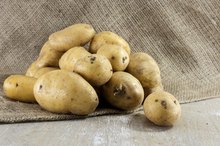What does fact checked mean?
At Healthfully, we strive to deliver objective content that is accurate and up-to-date. Our team periodically reviews articles in order to ensure content quality. The sources cited below consist of evidence from peer-reviewed journals, prominent medical organizations, academic associations, and government data.
- "Journal of Dermatological Science"; The Effect of a Low Glycemic Load Diet on Acne Vulgaris ... ; R.N. Smith, et al.; April 2008
- "Journal of Dermatological Science"; The Effect of a Low Glycemic Load Diet on Acne Vulgaris ... ; R.N. Smith, et al.; April 2008
- "Journal of the American Academy of Dermatology"; The Prevalence of Acne in Adults 20 Years and Older; C.N. Collier, et al.; January 2008
- "Journal of the American Academy of Dermatology"; The Prevalence of Acne in Adults 20 Years and Older; C.N. Collier, et al.; January 2008
- Harvard University: Glycemic Index and Glycemic Load for 100+ Foods
- "International Journal of Dermatology"; Diet and Acne: A Review of the Evidence; E. Spencer, et al.; April 2009
The information contained on this site is for informational purposes only, and should not be used as a substitute for the advice of a professional health care provider. Please check with the appropriate physician regarding health questions and concerns. Although we strive to deliver accurate and up-to-date information, no guarantee to that effect is made.
Are Brown Rice and Sweet Potatoes Good for Acne?
Acne is one of the most prevalent health problems that affect the skin, according to a study published in the January 2008 edition of the "Journal of the American Academy of Dermatology." Although common in teenagers, more than 70 percent of adults over the age of 20 struggle with acne, the paper notes 3. Certain foods, including brown rice and sweet potatoes, may aid in the reduction of acne symptoms in acne sufferers of all ages.
Background
Like many chronic diseases, acne has several underlying causes. Risk factors for acne include a family history of acne, use of pore-clogging medications, tobacco use and poor facial hygiene. According to a review paper published in by Elsa H. Spencer, Ph.D., of the George Washington University School of Medicine, diet plays an important role in the development of acne. Spencer notes that certain dietary modifications can reduce a trio of acne contributors: free radical exposure, inflammation and elevated insulin levels.
- Like many chronic diseases, acne has several underlying causes.
Brown Rice
Grapes & Acne
Learn More
Brown rice is a whole grain that's rich in dietary fiber and thiamine. Also, brown rice has a low glycemic load, meaning that it's digested slowly by the body. Low glycemic load foods don't increase insulin levels as much as high glycemic load foods. Research published in the April 2008 "Journal of Dermatological Science" found that adopting a low glycemic load diet significantly improved symptoms of acne in a group of 30 male research subjects 2.
- Brown rice is a whole grain that's rich in dietary fiber and thiamine.
- Also, brown rice has a low glycemic load, meaning that it's digested slowly by the body.
Sweet Potatoes
Sweet potatoes are rich in dietary fiber, vitamin C and potassium. Like brown rice, sweet potatoes have a low glycemic load. Nutrition scientist Loren Cordain's book, "The Dietary Cure For Acne," notes that high levels of free radicals on the skin can contribute to the formation of acne 1. Antioxidants are natural compounds in food that destroy free radicals. Sweet potatoes are an excellent source of an antioxidant class known as carotenoids.
- Sweet potatoes are rich in dietary fiber, vitamin C and potassium.
- Sweet potatoes are an excellent source of an antioxidant class known as carotenoids.
Considerations
Tuna and Acne
Learn More
While dietary modifications can help improve acne symptoms in certain people, diet should be combined with medical treatments prescribed by your physician. Also, no research study has investigated the effects of sweet potatoes or brown rice on acne. Other ways you can combat acne is by avoiding high glycemic load foods, such as refined grains, and consuming a diet rich in fresh fruits and vegetables.
Related Articles
References
- "The Dietary Cure For Acne"; Loren Cordain, Ph.D.; 2006
- "Journal of Dermatological Science"; The Effect of a Low Glycemic Load Diet on Acne Vulgaris ... ; R.N. Smith, et al.; April 2008
- "Journal of the American Academy of Dermatology"; The Prevalence of Acne in Adults 20 Years and Older; C.N. Collier, et al.; January 2008
- Harvard University: Glycemic Index and Glycemic Load for 100+ Foods
- "International Journal of Dermatology"; Diet and Acne: A Review of the Evidence; E. Spencer, et al.; April 2009
- Kraft J, Freiman A. Management of acne. CMAJ. 2011;183(7):E430-5. doi:10.1503/cmaj.090374
- Sutaria AH, Masood S, Schlessinger J. Acne Vulgaris. [Updated 2019 Dec 13]. In: StatPearls [Internet]. Treasure Island (FL): StatPearls Publishing; 2019 Jan-. Available from: https://www.ncbi.nlm.nih.gov/books/NBK459173/
- American Academy of Dermatology. WHAT CAN CLEAR SEVERE ACNE?
- Cleveland Clinic. Rosacea (Adult Acne). Last reviewed October 10, 2019.
- American Academy of Dermatology. IS SPORTS EQUIPMENT CAUSING YOUR ACNE?
- American Academy of Dermatology. I HAVE ACNE! IS IT OKAY TO WEAR MAKEUP?
- Zaenglein AL, Pathy AL, Schlosser BJ, Alikhan A, Baldwin HE, et. al. "Guidelines of Care for the Management of Acne Vulgaris." Journal of the American Academy of Dermatology; 2016. 74(5):945-73.
Writer Bio
Ryan Devon is a registered dietitian with a Master of Science in nutrition and health promotion from Simmons College. He starting writing in 2010, specializing in weight management and eating-disorder science.









